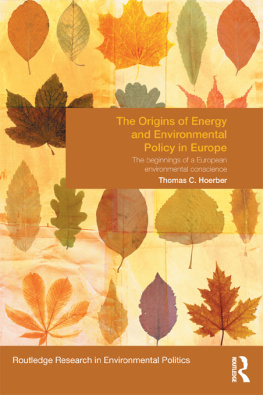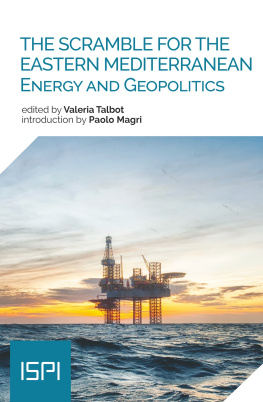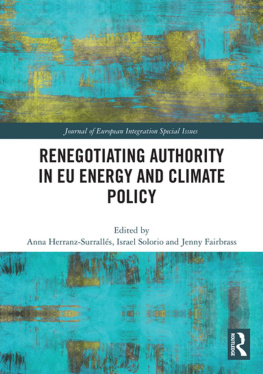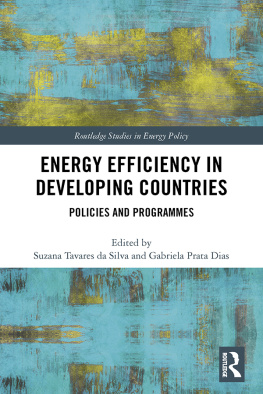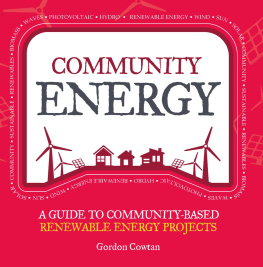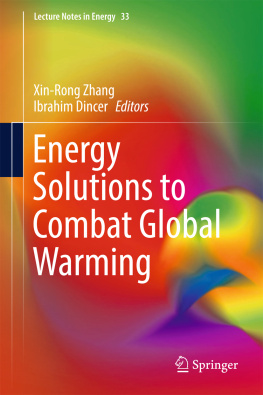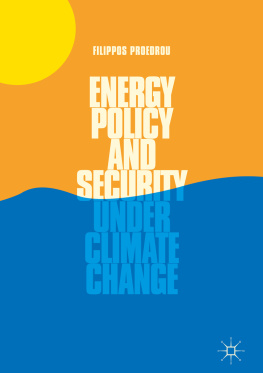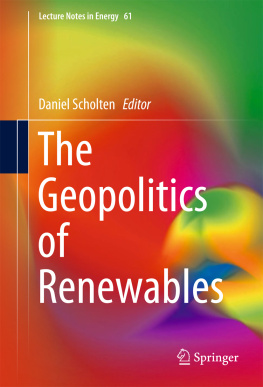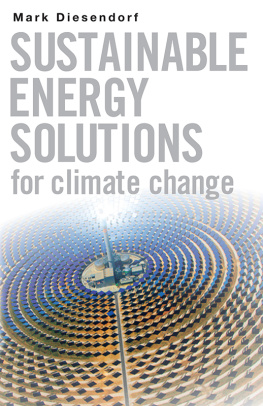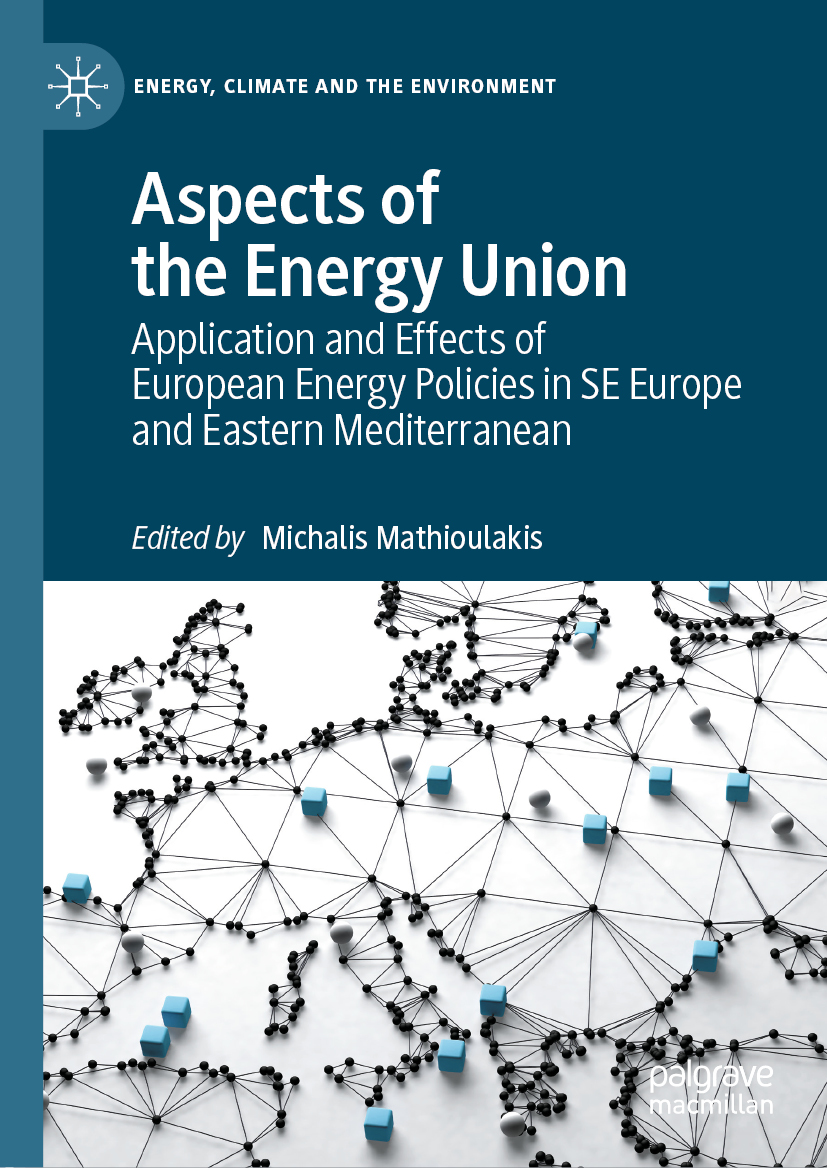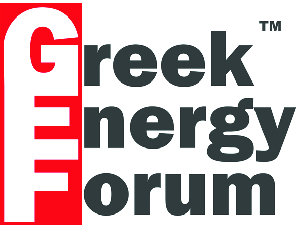Energy, Climate and the Environment
Series Editors
David Elliott
The Open University, Milton Keynes, UK
Geoffrey Wood
School of Law, University of Stirling, Stirling, UK
The aim of this series is to provide texts which lay out the technical, environmental and political issues relating to proposed policies for responding to climate change. The focus is not primarily on the science of climate change, or on the technological detail, although there will be accounts of this, to aid assessment of the viability of various options. However, the main focus is the policy conflicts over which strategy to pursue. The series adopts a critical approach and attempts to identify flaws in emerging policies, propositions and assertions. In particular, it seeks to illuminate counter-intuitive assessments, conclusions and new perspectives. The intention is not simply to map the debates, but to explore their structure, their underlying assumptions and their limitations. The books in this series are incisive and authoritative sources of critical analysis and commentary, clearly indicating the divergent views that have emerged whilst also identifying the shortcomings of such views. The series does not simply provide an overview, but also offers policy prescriptions.
More information about this series at http://www.palgrave.com/gp/series/14966
Editor
Michalis Mathioulakis
Aspects of the Energy Union
Application and Effects of European Energy Policies in SE Europe and Eastern Mediterranean
1st ed. 2021
Editor
Michalis Mathioulakis
Greek Energy Forum, Athens, Greece
Energy, Climate and the Environment
ISBN 978-3-030-55980-9 e-ISBN 978-3-030-55981-6
https://doi.org/10.1007/978-3-030-55981-6
The Editor(s) (if applicable) and The Author(s), under exclusive license to Springer Nature Switzerland AG 2021
This work is subject to copyright. All rights are solely and exclusively licensed by the Publisher, whether the whole or part of the material is concerned, specifically the rights of translation, reprinting, reuse of illustrations, recitation, broadcasting, reproduction on microfilms or in any other physical way, and transmission or information storage and retrieval, electronic adaptation, computer software, or by similar or dissimilar methodology now known or hereafter developed.
The use of general descriptive names, registered names, trademarks, service marks, etc. in this publication does not imply, even in the absence of a specific statement, that such names are exempt from the relevant protective laws and regulations and therefore free for general use.
The publisher, the authors and the editors are safe to assume that the advice and information in this book are believed to be true and accurate at the date of publication. Neither the publisher nor the authors or the editors give a warranty, expressed or implied, with respect to the material contained herein or for any errors or omissions that may have been made. The publisher remains neutral with regard to jurisdictional claims in published maps and institutional affiliations.
Cover credit: Carloscastilla/Alamy Stock Photo
This Palgrave Macmillan imprint is published by the registered company Springer Nature Switzerland AG
The registered company address is: Gewerbestrasse 11, 6330 Cham, Switzerland
Foreword
This book conveys the main themes of the Energy Union Future Leaders Academy, an international educational programme created and annually hosted by the Greek Energy Forum since 2017 with the objective to disseminate knowledge on the pillars of the Energy Union. This initiative has already become an institution for the South-eastern European region and aspires to evolve into a beacon of insight and inspiration for talented young individuals that have the willingness and potential to lead the European energy sector into its future. It has now become clearer than ever that regionality is an integral component of contemporary energy policy. Only by working together, the European Member States and their citizens may achieve an efficient, sustainable and overall better common energy future. This has been the core of the vision of the Energy Union since its inception. Extending this vision even further, the European Commission is now moving forward with the introduction of the European Green Deal, a roadmap for achieving a carbon-neutral Europe by 2050. This objective entails a requirement to enhance economic competitiveness, decouple growth from unsustainable physical resource exploitation and ensure that no community or citizen is left behind.
Europe needs to turn the climate and environmental challenges ahead into opportunities that should make the Energy Transition fair and inclusive for all. Once again, the pillars for the success of the European Green Deal will be cooperation across borders, strong human capital and competent leadership. This is why initiatives like the Energy Union Future Leaders Academy deserve support and have received the official endorsement of the European Commission and of its former Vice President in charge of the Energy Union, Maros Sefcovic; because they expose talented young individuals interested in energy to the benefits of the Energy Union and through this to the very essence of regional cooperation and efficient policymaking. In this context, this publication provides a series of insightful presentations from academics, energy professionals and experts, on a broad range of critical issues that presently concern the European energy sector. I truly hope that this book will act as a source of knowledge, insight and inspiration for the readers who aspire to become promoters of the Energy Union and of the Energy Transition towards 2050.
Alexandros Lagakos Co-Founder/Vice Chairman
Preface
This publication represents a multi-dimensional, comprehensive presentation of some of the most critical issues regarding the EUs Energy Union policy. The Energy Union is the driving force behind all the EUs objectives regarding energy and the environment. Applied European energy policies face several challenges ranging from the Geopolitics of Energy and Energy Regulation, to Climate Change, advancing Renewable and Gas technologies, and Consumer Empowerment structures. This book aims to provide an insightful look into some of these vital issues regarding the European energy sector with a special focus to the effects the Energy Union policy has in two sensitive regional systems, South-Eastern Europe, and the Eastern Mediterranean. The context of this publication spawns from a training programme by the Greek Energy Forum on the European Commissions Energy Union strategy. The Greek Energy Forum is an international energy think tank consisting of Greek energy professionals aspiring to establish an international platform of ideas and dialogue among energy professionals to enable change in the energy setting of SE Europe and the Eastern Mediterranean. The Energy Union Future Leaders Academy training programme introduces university students from South-Eastern Europe to the significance of the European Energy Union and highlights the indispensable element of regionality in contemporary European energy policies. Following up on the basic concept of the Academy, this publication aims to address a series of issues essential for the future of energy systems in Europe. Part of the included analysis focuses on the effects of applied policies on the regional sub-systems of SE Europe and the Eastern Mediterranean.


